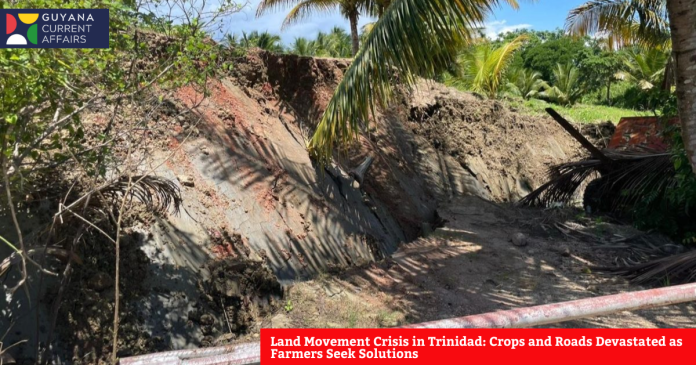A sudden and severe land movement in southern Trinidad has wreaked havoc on agricultural lands and infrastructure, leaving dozens of farmers and local communities struggling to cope with the fallout. The incident, centered around Royal Engineer Road in Los Iros, has resulted in the destruction of approximately 20 hectares of active farmland, significant crop loss, and severe damage to roads that provide essential access to the area.
Government officials, including Minister in the Ministry of Agriculture, Land and Fisheries Saddam Hosein and La Brea Member of Parliament Clyde Elder, conducted emergency assessments on-site this week. Their tour revealed the extent of the devastation, with over 35 farmers now facing restricted access to their plots and mounting losses. The Ministry has pledged to address land degradation and support affected farmers, emphasizing the need to strengthen resilience against climate-related challenges.
Preliminary reports and local speculation suggest that seismic activity and the presence of active mud volcanoes in the vicinity may be contributing factors. While technical assessments are still underway, the situation has raised concerns about the stability of the land and the long-term viability of farming in the region.
South Oropouche Riverine Flood Action Group president Edward Moodie, who accompanied officials during the visit, highlighted access as a major challenge, noting that alternative routes are now being explored to help farmers reach their land. The Ministry has assured that it will engage technical experts to evaluate the causes and recommend sustainable solutions.
The crisis in Los Iros is not isolated. Similar land movements have previously affected other parts of southern Trinidad, such as Quarry Village in Siparia, where major road damage cut off dozens of families and required multi-agency collaboration to restore connectivity. These recurring events underscore the vulnerability of rural communities to land destabilization and the urgent need for comprehensive adaptation strategies.
As Trinidad and Tobago’s government works to assess the damage and provide immediate assistance, affected farmers are left hoping for swift action and long-term support to safeguard their livelihoods and the nation’s food security. The situation serves as a stark reminder of the growing risks posed by environmental and geological hazards in the region.


